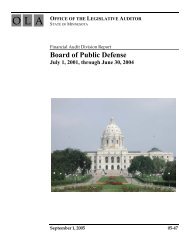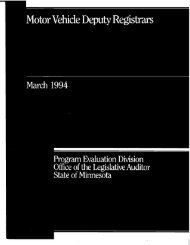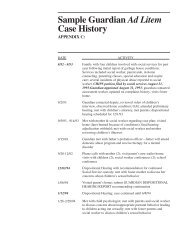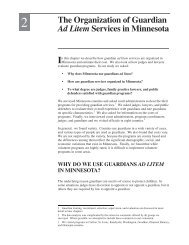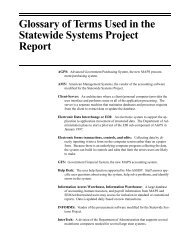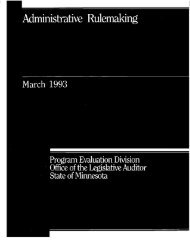Occupational Regulation - Office of the Legislative Auditor
Occupational Regulation - Office of the Legislative Auditor
Occupational Regulation - Office of the Legislative Auditor
You also want an ePaper? Increase the reach of your titles
YUMPU automatically turns print PDFs into web optimized ePapers that Google loves.
EFFECTIVENESS OF OCCUPATIONAL REGULATION 53<br />
Better<br />
information is<br />
needed on how<br />
regulatory<br />
proposals meet<br />
state policy<br />
objectives. We<br />
suggest several<br />
options for<br />
carrying out<br />
studies <strong>of</strong><br />
regulatory<br />
proposals.<br />
<strong>the</strong>se are recommendations which have been made before and even tried before<br />
but we think <strong>the</strong>re are compelling reasons to try again. Our interviews detected no<br />
widespread sense <strong>of</strong> urgency, however, even among legislators and o<strong>the</strong>rs who<br />
think <strong>the</strong>re is a real problem, so our options include incremental steps that can be<br />
taken without any major organizational changes. As one option:<br />
· The Legislature could require a study <strong>of</strong> how each major proposal for<br />
new regulation or significant increase in regulation meets <strong>the</strong> Chapter<br />
214 criteria.<br />
There are several alternatives for conducting <strong>the</strong> studies. They could be carried<br />
out by state agencies, by specialized legislative staff, or by existing committees.<br />
As we discussed in Chapter 1, <strong>the</strong> Minnesota Department <strong>of</strong> Health (MDH)<br />
Human Services <strong>Occupational</strong> Advisory Council (HSOAC) used to perform such<br />
studies for <strong>the</strong> health-related occupations, and many in <strong>the</strong> Legislature and<br />
elsewhere believe <strong>the</strong> studies were useful even though <strong>the</strong> recommendations <strong>of</strong><br />
MDH were not always heeded.<br />
The following option could be tried without implementing any major<br />
organizational changes:<br />
· Committees hearing bills proposing new occupational regulation could<br />
require proponents to submit specific information as a condition for<br />
obtaining a hearing.<br />
The virtue <strong>of</strong> this idea would be to focus debate on issues relating to <strong>the</strong> Chapter<br />
214 criteria. The criteria would have to be operationalized in a specific set <strong>of</strong><br />
questions, however. The questions asked by <strong>the</strong> Health Department in carrying<br />
out <strong>the</strong> HSOAC studies could serve as a model. Additional models are provided<br />
by o<strong>the</strong>r states that have institutionalized a sunrise process. For example, <strong>the</strong><br />
Florida House <strong>of</strong> Representatives Committee on Business and Pr<strong>of</strong>essional<br />
<strong>Regulation</strong> uses a “Sunrise Questionnaire” that poses 62 questions that proponents<br />
<strong>of</strong> regulation must address. Florida’s sunrise law is similar to that <strong>of</strong> Minnesota<br />
and o<strong>the</strong>r states with such legislation in that <strong>the</strong> regulatory decision hinges on <strong>the</strong><br />
extent to which <strong>the</strong> unregulated practice <strong>of</strong> <strong>the</strong> occupation will endanger <strong>the</strong><br />
public health, safety, or welfare. Maine has put a set <strong>of</strong> questions into its statute<br />
governing occupational regulation.<br />
We think legislative committees could use a relatively simple version <strong>of</strong> <strong>the</strong>se<br />
questionnaires in <strong>the</strong> first stage <strong>of</strong> <strong>the</strong> process by which regulatory proposals are<br />
considered, and require a more detailed study for those ideas that make <strong>the</strong> first<br />
cut. Figure 3.2 lists some illustrative questions proponents for occupational<br />
regulation could be required to address.<br />
A secondary benefit <strong>of</strong> requiring specific information would be that some groups<br />
seeking regulation would be unable to mount <strong>the</strong> organized effort to produce a<br />
reasonable proposal. The ability to do so is not irrelevant to <strong>the</strong> issue under<br />
consideration because if an occupation or pr<strong>of</strong>ession has not reached a certain<br />
level <strong>of</strong> maturity and separate identity, it cannot be regulated effectively by<br />
enacting a practice act, issuing credentials that have a specific meaning, and<br />
enforcing standards <strong>of</strong> practice. As a practical matter, to be regulated an



